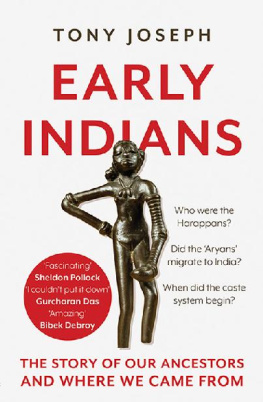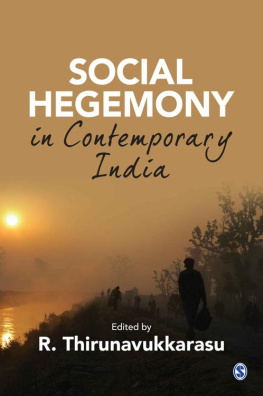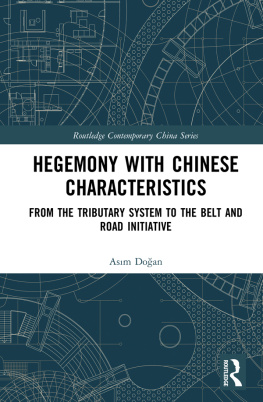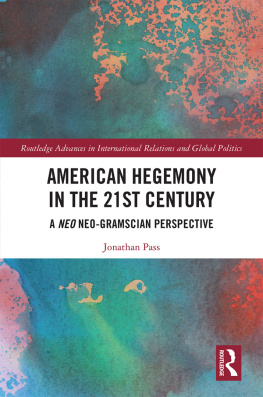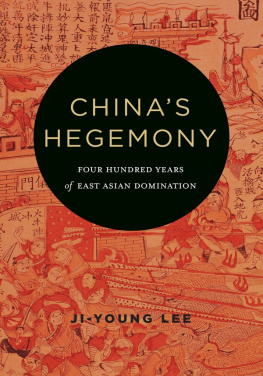Joseph - Hegemony
Here you can read online Joseph - Hegemony full text of the book (entire story) in english for free. Download pdf and epub, get meaning, cover and reviews about this ebook. City: London, year: 2002, publisher: Routledge, genre: Politics. Description of the work, (preface) as well as reviews are available. Best literature library LitArk.com created for fans of good reading and offers a wide selection of genres:
Romance novel
Science fiction
Adventure
Detective
Science
History
Home and family
Prose
Art
Politics
Computer
Non-fiction
Religion
Business
Children
Humor
Choose a favorite category and find really read worthwhile books. Enjoy immersion in the world of imagination, feel the emotions of the characters or learn something new for yourself, make an fascinating discovery.
Hegemony: summary, description and annotation
We offer to read an annotation, description, summary or preface (depends on what the author of the book "Hegemony" wrote himself). If you haven't found the necessary information about the book — write in the comments, we will try to find it.
Hegemony — read online for free the complete book (whole text) full work
Below is the text of the book, divided by pages. System saving the place of the last page read, allows you to conveniently read the book "Hegemony" online for free, without having to search again every time where you left off. Put a bookmark, and you can go to the page where you finished reading at any time.
Font size:
Interval:
Bookmark:

Why is hegemony an essential feature of society?
Hegemony: A Realist Analysis is a new and original approach to this important concept. It presents a theoretical history of the use of hegemony in a range of work starting with a discussion of Gramsci and Russian Marxism and going on to look at more recent applications. It examines the current debates and discusses the recent work on Marx by Jacques Derrida, before outlining a critical realist/Marxist alternative.
This book presents a new understanding of hegemony based on a distinction between actual hegemonic projects and a deeper, underlying, structural hegemony. The move away from purely intersubjective and culturalist readings of the concept is reinforced with studies of its objectivity, its relation to ideology and concepts of time and space, and most importantly, its role in the process of social reproduction and transformation. The book also contains a detailed discussion of recent political/economic developments and the debates around post-Fordism, globalisation and international relations. This analysis shifts from the surface level operation of hegemony to the underlying social conditions under which this operation takes place. It suggests that as well as being represented by hegemonic projects, hegemony also exists at a deeper, more structural level, concerned with the unity of the social formation.
Hegemony employs critical realist philosophy in an explanatory way to help clarify the concept of hegemony and its relation to societal processes. This work contributes to recent debates in social science and political philosophy, developing both the concept of hegemony itself, and the work of critical realism.
Jonathan Joseph teaches social science and philosophy at Goldsmiths College, London, and at The Open University. He has written articles on Marxism, critical realism, hegemony and deconstruction and is on the editorial board of Capital & Class.
Edited by Margaret Archer, Roy Bhaskar, Andrew Collier, Tony Lawson and Alan Norrie
Critical realism is one of the most influential new developments in the philosophy of science and in the social sciences, providing a powerful alternative to positivism and post modernism. This series will explore the critical realist position in philosophy and across the social sciences.
1. Marxism and Realism
A materialistic application of realism in the social science
Sean Creaven
2. Beyond Relativism
Raymond Boudon, cognitive rationality and critical realism
Cynthia Lins Hamlin
3. Education Policy and Realist Social Theory
Primary teachers, child-centred philosophy and the new managerialism
Robert Willmott
4. Hegemony
A realist analysis
Jonathan Joseph
Also published by Routledge:
Edited by Margaret Archer, Roy Bhaskar, Andrew Collier, Tony Lawson and Alan Norrie
Critical Realism
Essential readings
Edited by Margaret Archer, Roy Bhaskar, Andrew Collier, Tony Lawson and Alan Norrie
The Possibility of Naturalism
A philosophical critique of the contemporary human sciences
Roy Bhaskar
Being and Worth
Andrew Collier
Quantum Theory and the Flight from Realism
Philosophical responses to quantum mechanics
Christopher Norris
From East to West
Odyssey of a soul
Roy Bhaskar
Realism and Racism
Concepts of race in sociological research
Bob Carter
Rational Choice Theory
Resisting Colonisation
Edited by Margaret Archer and Jonathan Q Tritter
Explaining Society
Critical realism in the social sciences
Berth Danermark, Mats Ekstrm, Jan Ch Karlsson and Liselotte Jakobsen
Critical Realism and Marxism
Edited by Andrew Brown, Steve Fleetwood and John Michael Roberts
Critical Realism in Economics
Edited by Steve Fleetwood
Realist Perspectives on Management and Organisations
Edited by Stephen Ackroyd and Steve Fleetwood
After International Relations
Critical realism and the (re)construction of world politics
Heikki Patomaki

First published 2002 by Routledge
11 New Fetter Lane, London EC4P 4EE
Simultaneously published in the USA and Canada
by Routledge
29 West 35th Street, New York, NY 10001
Routledge is an imprint of the Taylor & Francis Group
2002 Jonathan Joseph
Typeset in Baskerville by Exe Valley Dataset Ltd, Exeter
Printed and bound in Great Britain by
Anthony Rowe Ltd, Chippenham, Wiltshire
All rights reserved. No part of this book may be reprinted or reproduced or utilised in any form or by any electronic, mechanical, or other means, now known or hereafter invented, including photocopying and recording, or in any information storage or retrieval system, without permission in writing from the publishers.
British Library Cataloging in Publication Data
A catalogue record for this book is available
from the British Library
Library of Congress Cataloging in Publication Data
A catalog record for this book has been requested
ISBN 0415268362
| PART 1 A theoretical history |
| PART 2 Theoretical questions |
I would like to thank a number of people for varying degrees of influence, encouragement and friendship. In particular I would like to thank Liam O'Sullivan, William Outhwaite, Abbas Vali, Simon Kennedy, Sarah Honeychurch, Ray Monk, Nick Davies, John Roberts, Bob Jessop and the late Paul Wozny (a great loss to the labour movement). I would like to thank my friends from the Kings College Realism Group Alan Norrie, Nick Hostettler, Mervyn Hartwig, Rachel Sharp and Kathryn Dean. And I would particularly like to thank Andrew Collier for our many discussions and Phil Walden who, ten years after introducing me to Marxism introduced me to critical realism he has either given me a great deal or led me seriously astray. I would like to thank Maureen, Simon and Sarah and I dedicate this book to my father, Martin Joseph, wishing, perhaps, that I had not so readily spurned his dinnertime sociology for the pleasures of the table.
The concept of hegemony is normally understood as emphasising consent in contrast to reliance on the use of force. It describes the way in which dominant social groups achieve rulership or leadership on the basis of attaining social cohesion and consensus. It argues that the position of the ruling group is not automatically given, but rather that it requires the ruling group to attain consent to its leadership through the complex construction of political projects and social alliances. These allow for the unity of the ruling group and for the domination of this group over the rest of society. In its simplistic form hegemony concerns the construction of consent and the exercise of leadership by the dominant group over subordinate groups; in its more complex form, this deals with issues such as the elaboration of political projects, the articulation of interests, the construction of social alliances, the development of historical blocs, the deployment of state strategies and the initiating of passive revolutions.
Font size:
Interval:
Bookmark:
Similar books «Hegemony»
Look at similar books to Hegemony. We have selected literature similar in name and meaning in the hope of providing readers with more options to find new, interesting, not yet read works.
Discussion, reviews of the book Hegemony and just readers' own opinions. Leave your comments, write what you think about the work, its meaning or the main characters. Specify what exactly you liked and what you didn't like, and why you think so.



